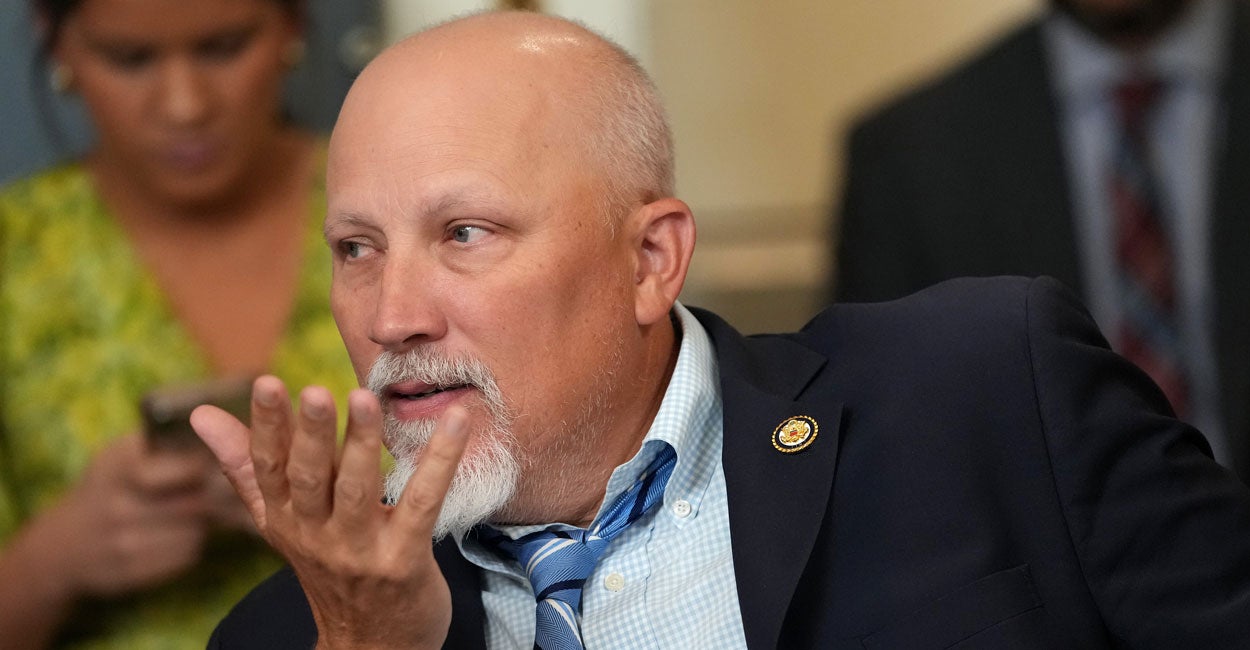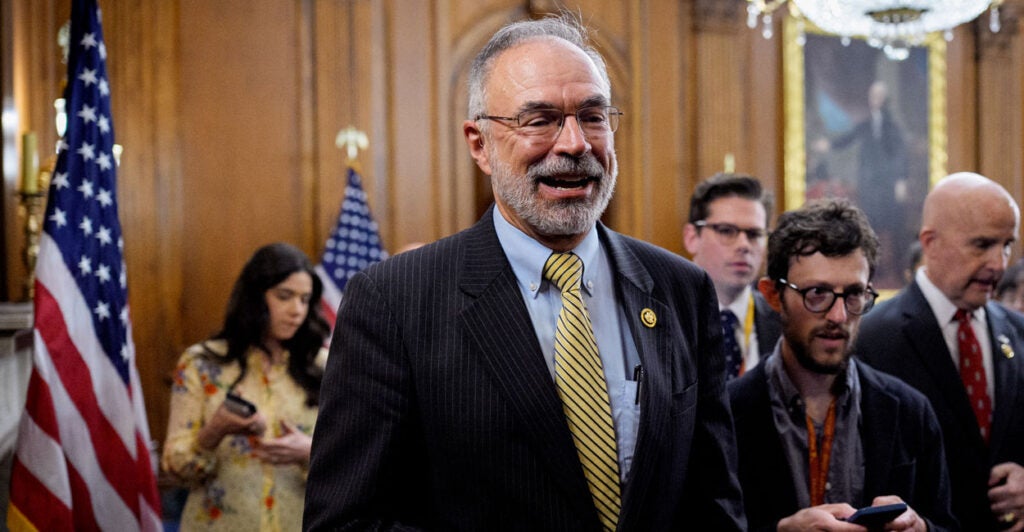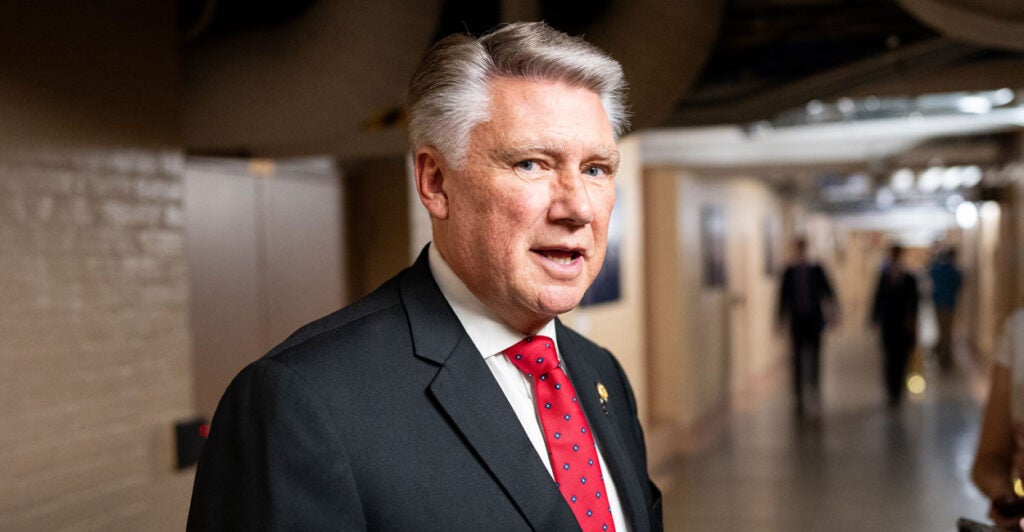


As Congress rushes to meet an end-of-September funding deadline to avoid a government shutdown, members of the fiscally conservative House Freedom Caucus are open to a surprising measure to reduce spending—extending spending from former President Joe Biden’s administration into the long term.
Although they have not finalized a proposal, multiple freedom caucus members told The Daily Signal that a long-term stopgap funding bill, or continuing resolution (CR) to further extend current spending could reduce the deficit and provide political stability ahead of the midterm elections.
Given that the House of Representatives has only passed three appropriations bills, a CR might be inevitable.
“It’s going to be a CR. Let’s admit it. We don’t have to discuss that,” Rep. Keith Self, R-Texas, told reporters Thursday as he discussed the impending funding deadline. “The question is, how clean of a CR and how long of a CR? We’ll see.”
House Freedom Caucus chairman Rep. Andy Harris, R-Md., told reporters on Thursday that his team is about to finalize their proposal for how to fund the government.
“We have a plan. We are putting the finishing touches on it. We do believe that the most important principle is not to increase funding above [fiscal year] 2024 levels, to keep us basically level funded for two years,” he said.
Harris believes that halting any spending increase would be a major conservative victory in Washington, where Congress almost never fails to increase spending.
“We believe, the [Congressional Budget Office] score, if we could achieve level funding, is on the order of four to 500 billion [in savings] over ten years, because they would normally assume an increase in funding,” said Harris in reference to the congressional budget watchdog’s projected savings from his proposals. “That’s a significant dent in our spending, and that’s our goal.”
What’s more, Harris is considering the benefits of a long-term CR in terms of providing immunity from protracted shutdown fights in the future.
He said that “our preference is a full-year CR … at fiscal year ‘24 spending levels,” but added it “makes sense” to discuss whether or not to extend a CR past the midterm elections rather than putting “the American people through the Chuck Schumer drama in September 2026 of a potential government shutdown.”

Adding to the appeal of a continuing resolution into 2026 for Harris is the fact that future appropriations bills are always an option, since they can replace parts of the continuing resolution’s funding.
“If we want to pass appropriations bills next year for any segment of that continuing resolution, you can. I mean, it would supersede the continuing resolution. But this would provide certainty of government funding. You know, no shutdown dramas before the next election. The American people just don’t deserve that,” he said.
On Saturday, Rep. Chip Roy, R-Texas, told The Daily Signal he’d “totally be great with a one-year freeze in spending for a year. That’s a victory for the American people every day and twice on Sunday.”
He explained that the caucus would not look kindly on any overall spending increase coming out of the annual funding process.
“The freedom caucus position is under no circumstances can spending be greater than current-level spending. It must be flat or go down,” Roy said, adding that the caucus would trust the White House to add spending cuts on top of this CR due to its work “shutting down and removing bureaucrats.”
Roy added, “at the end of the day, if you’re holding spending frozen while you go grow the economy, you’re winning, because you have a president who’s willing to go take on the Swamp. Now I’d love to pass appropriations bills with massive cuts, but we got to get it through a Senate with Democrats, and you’ve got to get 60 votes in the Senate.”
Rep. Mark Harris, R-N.C., wants to make clear that the freedom caucus wants, in an ideal world, to fund the government with regular appropriations bills—but that might not be a viable option.
“I want our people to understand we are proponents of doing regular order, ultimately, and passing 12 appropriation bills. That’s what we set out to do.” Harris told The Daily Signal.
“But the reality is, we’ve only got three out of 12 that we’ve passed. And we may do another one next week, I don’t know, but we’re coming up on September 30. It is becoming more and more evident that it will be a CR that we’re going to be looking at.”
He explained that, given the high likelihood of some stopgap funding bill to extend previous spending, he’d prefer a long-term bill, especially a “clean” one which roughly continues current spending levels.

“I personally feel like just having a yearlong CR that’s clean, with nothing, would be probably the best, because it would hold spending levels where they are. And to not have increases, I think, is probably a good thing,” Harris told The Daily Signal.
Like Roy, Harris believes that holding spending flat while the Trump administration sends rescissions packages—a type of filibuster-proof legislation used to cancel unspent funds—would be a major step toward reducing overall government spending.
In July, Congress voted to cancel $9 billion in funds to foreign aid and public broadcasting. More recently, the Office of Management and Budget attempted to cancel $4.9 billion in foreign aid spending without a vote from Congress in what is called a “pocket rescission.”
This attempt was blocked by U.S. District Judge Amir Ali, but the legal battle is likely to continue in higher courts.
“We’ve got a good Office of Management and Budget and Russ Vought and my predecessor, Dan Bishop, working together in there,” he said, referring to the agency’s director and deputy director.
“And so I would trust their judgment when it comes to these rescissions or other things that they feel like they are needing to do, or to send up to Congress the next rescission package.”
For Mark Harris, the fight to reduce discretionary spending is vital to addressing the national debt and ever-rising spending.
“If we can’t get government under control, with a Republican House, a Republican Senate and a Republican president fulfilling the commitments and promises we’ve made, then I am sorely concerned for our future and our economic future in this country, and I think Americans are ready to see some real decisions,” he said.
